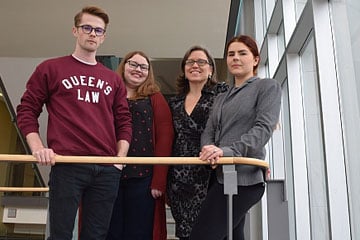
A private member’s bill aiming to waive the required fees in obtaining government identification for low-income or precariously housed people was up for debate at the Ontario Legislature March 29 by Kingston/the Islands MPP Sophie Kiwala, thanks to Queen’s University law students and their Fee Waiver Initiative through Pro Bono Students Canada.

A private member’s bill aiming to eliminate fees for low-income or precariously housed people who need government identification passed second reading in the Ontario Legislature March 29, thanks to some help from Queen's University law students and Pro Bono Students Canada.
The bill was presented by Kingston/the Islands MPP Sophie Kiwala. PBSC’s chapter of the ID Clinic Project reached out to Kiwala, who introduced Bill 26: The Fee Waivers Act. It has now been passed to the Standing Committee on Regulations and Private Bills.
PBSC has been working on the fee waiver initiative and the bill, aimed to amend the Photo Card Act, 2008 and the Vital Statistics Act so people who cannot afford to pay the associated fees for government photo cards or for birth certificates no longer have to.
“In many ways, this is really an issue of human dignity. There’s no reason why people who are marginally housed or homeless shouldn’t be able to have access to the kind of ID that they need in order to live with dignity as citizens of this province,” says Nikki Gershbain, national director of PBSC.
The students involved in the initiative reached out to Kiwala about the ID dilemma with the support of Karla McGrath, executive director of Queen’s Law Clinics, to let her know about the issue in the community and nationwide.
The organization runs 10 ID clinics nationally. They operate in British Columbia (Vancouver and Victoria), Saskatchewan (Saskatoon) and Ontario (London, Ottawa, Thunder Bay, Kingston and three clinics in Toronto). Here, student volunteers who select this placement through PBSC assist clients by filling out often complicated and bureaucratic paperwork to apply for their ID. The organization also provides a mailing address for government mail correspondence to homeless individuals.
Students work under the supervision of licensed lawyers, so they are also able to provide meaningful legal referrals to clients, too.
Without government ID, individuals cannot obtain social assistance, open bank accounts, secure housing or receive medical care. When individuals want to apply for new pieces of ID both provincially and federally, they need a birth certificate — often something these people lack as well.
In fact, according to PBSC, Canadian research shows that homeless or precariously housed people are “disproportionally susceptible to losing their government-issued identification or having it stolen.” These people often cannot afford to pay the costs associated with replacement ID either.
“We’re often asking [the clients], ‘What type of pieces of identification do you have?’ and they’re pulling out bus passes, health cards, and they don’t have birth certificates,” says Olga Michtchouk, ID clinic co-ordinator at PBSC Queen’s.
“The stories behind why they don’t have it are various: They could be transient, they could be stolen, they could be lost or if they were incarcerated, perhaps with their personal belongings, that got lost in the system.”
An example of a barrier people without ID face is access to social assistance from the Ontario Disability Support Program. Michtchouk says the ODSP used to distribute cheques to recipients, who could then cash them without requiring a bank account. But now, the program provides money through direct deposit, which requires a bank account. If someone doesn’t have ID to create a bank account in the first place, they cannot receive their social assistance payment.
“[When filing paperwork for clients], you could see people’s faces fall when you told them that, ‘Now you have to take this paperwork to Service Ontario and you have to pay $35,’ you can tell instantly that not only were they not going to do it but they couldn’t do it,” she says.
But there was some irony about the Thursday debate at the Ontario Legislative Assembly.
“In order to get into Queen’s Park for the debate, you need a government-issued piece of identification,” Gershbain says. “So the very people we are doing this for are not eligible to participate in the democratic process. It’s obvious that there is a gap here that needs to be addressed.”
Another vulnerable group that the ID Clinic Project aims to help is the transgender community. Though a separate initiative, she says, PBSC’s ID Clinic Project has partnered with Sketch (a Toronto-based resource centre for street-involved transgender youth) to assist transgender youth in securing their name and gender marker change on ID. She adds that she hopes this initiative will spread through chapters across the country.
“There are so many ways that you can’t participate in our society if you don’t have ID. We take it all for granted,” says Gershbain.